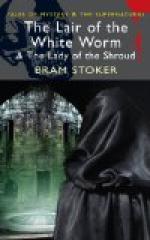“I have brought you here, Adam, because it seems to me that this is the spot on which to begin our investigations. You have now in front of you almost the whole of the ancient kingdom of Mercia. In fact, we see the whole of it except that furthest part, which is covered by the Welsh Marches and those parts which are hidden from where we stand by the high ground of the immediate west. We can see—theoretically—the whole of the eastern bound of the kingdom, which ran south from the Humber to the Wash. I want you to bear in mind the trend of the ground, for some time, sooner or later, we shall do well to have it in our mind’s eye when we are considering the ancient traditions and superstitions, and are trying to find the rationale of them. Each legend, each superstition which we receive, will help in the understanding and possible elucidation of the others. And as all such have a local basis, we can come closer to the truth—or the probability—by knowing the local conditions as we go along. It will help us to bring to our aid such geological truth as we may have between us. For instance, the building materials used in various ages can afford their own lessons to understanding eyes. The very heights and shapes and materials of these hills—nay, even of the wide plain that lies between us and the sea—have in themselves the materials of enlightening books.”
“For instance, sir?” said Adam, venturing a question.
“Well, look at those hills which surround the main one where the site for the Castle was wisely chosen—on the highest ground. Take the others. There is something ostensible in each of them, and in all probability something unseen and unproved, but to be imagined, also.”
“For instance?” continued Adam.
“Let us take them seriatim. That to the east, where the trees are, lower down—that was once the location of a Roman temple, possibly founded on a pre-existing Druidical one. Its name implies the former, and the grove of ancient oaks suggests the latter.”
“Please explain.”
“The old name translated means ‘Diana’s Grove.’ Then the next one higher than it, but just beyond it, is called ’Mercy’—in all probability a corruption or familiarisation of the word Mercia, with a Roman pun included. We learn from early manuscripts that the place was called Vilula Misericordiae. It was originally a nunnery, founded by Queen Bertha, but done away with by King Penda, the reactionary to Paganism after St. Augustine. Then comes your uncle’s place—Lesser Hill. Though it is so close to the Castle, it is not connected with it. It is a freehold, and, so far as we know, of equal age. It has always belonged to your family.”
“Then there only remains the Castle!”
“That is all; but its history contains the histories of all the others—in fact, the whole history of early England.” Sir Nathaniel, seeing the expectant look on Adam’s face, went on:




